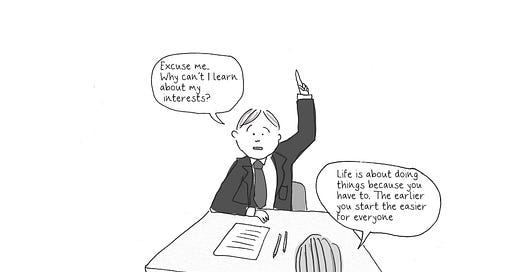When we make children do something, their relationship with it changes. We know that, because most of us have the same experience as adults.
We’re made to read a book, and suddenly it’s less interesting. We’re told we have to attend a meeting, and we drag our feet. I even feel this way if someone tells me that I ‘must’ watch a TV programme. I want to watch it less.
Of course we all have to do things something that we would prefer not to do. I might go to work because I need the money, or wake up with my children in the night because they need me. I do it because it’s important, not because I enjoy it.
But with children we often expect them to do something that they don’t want to do, don’t see the purpose of and that has no pay-off for them. They have to do it just ‘because’. In the name of education we make them do things because we think they are important, but the children don’t agree.
We give them no choice at all, not as the exception but consistently, for years. This changes their relationship with what they do.
And when that ‘thing’ is learning, this has serious implications. Children learn that learning is boring, that it feels pointless and that it’s hard. They learn that they are no good at learning.
They are made to do things and they can’t say no, so instead they learn to go through the motions. They learn to do as little as possible but to appear as if they are complying. They learn that learning is a passive process. They learn to be afraid of difficult things. They run away and hide.
This isn’t inevitable. We rarely appreciate the power of being able to opt out, but for many of us, being able to say No allows us to say Yes.
What stops us? It’s those voices which whisper ‘but what if they never learn?’. That anxiety which says ‘but aren’t they behind?’. We push and we pressurise out of fear for our children - but the pressure itself becomes the problem.
When we allow children to say no, their relationship with learning changes. For so many of them, it’s allowing them to say No which enables them to - in their own time and their own way - to say Yes.
Illustration by





I'm reminded of my relationship to reading: I was absolutely impatient to start school so I could learn and up to a certain age I was reading all the time. At 8 I was reading 800-pages bricks regularly and sometimes I read all night.
But we then started having to write reports, which I felt was an intrusion.
Then at 12 my middle school had a bright idea: put a table full of books in our classes. I thought it was Christmas - I could just pick one and read it whenever. But there was a catch: this was for a competition - we were to read as many of the books and remember trivia from them (page number, character names, events, author names, etc.). A classmate of mine took a fair few because he didn't trust us to remember facts, we never got to read them and we lost anyway.
I hated the whole thing: I don't tend to remember names, I remember what happens, or what I think of the themes. Whether it was going to happen anyway or not, I don't know but I did not read much at all for ages jist after that. Every time I looked at the books I just felt like they were no fun anymore. And it felt even more unfair because so many of the books had been taken by someone because he didn't trust us. Fortunately school never forced me to read comics, so I switched to them instead. Even now, it still feels like books are a thing I 'ought' to read, rather than what they used to be.
Really needed to hear this today, after just arguing w my 10yo about how she needs to start reading chapter books vs graphic novels and sleeping in her own room vs on my bedroom floor. Why I thought I’d be able to convince her is beyond me. Thank you for this reminder. 🙏🏽